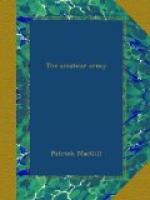Passes were generally inspected at the station preceding the one to which we were bound. My travelling companions were well aware of this, and made preparations to combat the difficulty in front; two crawled under the seats, and two more went up on the racks, where they lay quiet as mice, stretched out at full length and covered over with several khaki overcoats. One man, a brisk Cockney, who would not deign to roost or crawl, took up his position as far away as possible from the platform window.
“Grease the paper along as quick as you know ’ow and keep the picket jorin’ till I’m safe,” he remarked as the train stopped and a figure in khaki fumbled with the door handle.
“Would you mind me lookin’ at passes, mateys?” demanded the picket, entering the compartment. The man by the door produced his pass, the one he had written and signed himself; and when it passed inspection he slyly slipped it behind the back of the man next him, and in the space of three seconds the brisk Cockney had the forged permit of leave to show to the inspector. The men under the seat and on the racks were not detected.
Every station in our town and its vicinity has a cordon of pickets, the Sunday farewell kisses of sweethearts are never witnessed by the platform porter, as the lovers in khaki are never allowed to see their loves off by train, and week-end adieux always take place at the station entrance. Some time ago the pickets allowed the men to see their sweethearts off, but as many youths abused the privilege and took train to London when they got on the platform, these kind actions have now become merely a pleasing memory.
Pickets seem to crop up everywhere; on one bus ride to London, a journey of twenty miles, I have been asked to show my pass three times, and on a return journey by train I have had to produce the written permit on five occasions. But some units of our divisions soar above these petty inconveniences, as do two brothers who motor home every Sunday when church parade comes to an end.
When these two leave church after divine service, a car waits them at the nearest street corner, and they slip into it, don trilby hats and civilian overcoats, and sweep outside the restricted area at a haste that causes the slow-witted country policeman to puzzle over the speed of the car and forget its number while groping for his pocket-book.
It has always been a pleasure to me to follow for hours the winding country roads looking out for fresh scenes and new adventures. The life of the roadside dwellers, the folk who live in little stone houses and show two flower-pots and a birdcage in their windows, has a strange fascination for me. When I took up my abode here and got my first free Sunday afternoon, I shook military discipline aside for a moment and set out on one of my rambles.




